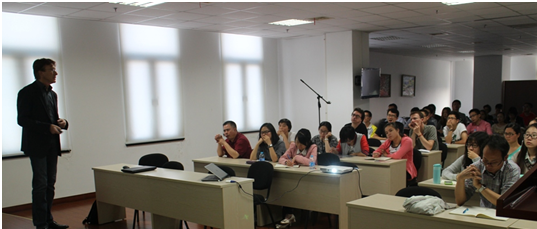Author:SIAIS
Date:26 October 2015
In the afternoon of Oct 23th,2015, Professor Dieter Willbold visited Shanghai Institute for AdvancedImmunochemical Studies (SIAIS), ShanghaiTech University and gave a talk on the development of Abeta oligomer directed therapy anddiagnosis of Alzheimer’s disease.
Prof. Dr. Dieter Willbold is the directorof the Institute of Structural Biochemistry at the Forschungzentrum Juelich,Germany, which is a member of the Helmholtz Association of German ResearchCenters and one of the largest interdisciplinary research centers in Europe.His research focuses on the development and application of methods to preciselyinvestigate three-dimensional structures and molecular mechanisms ofbiologically and medically relevant macromolecules involved in cellularprocesses like signaling pathways and autophagy. The structural basis of protein-proteinand protein-ligand interactions is an important focus.
Function and malfunction of mostinvestigated proteins play decisive roles in the development and progression ofneurodegenerative diseases, like “Alzheimer”, “Parkinson” and prion diseases.His group has developed novel approaches towards prevention and therapy ofAlzheimer's disease. Since it is known that Aβ oligomers are the major toxicspecies responsible for development and progression of Alzheimer’s disease, theWillbold lab is developing D-enantiomeric peptides that are directed against Aβoligomers. One of these peptides, D3, was shown to eliminate Aβ oligomers.Furthermore, it was shown to be therapeutically active in transgenic AD miceeven after oral application. D3 treatment leads to drastic reductions of Aβplaque load and brain inflammation and an improvement of the cognitiveperformance.

His talk attracted many faculties andstudents from school of life science, ihuman, SIAIS and biopharmaceuticalcompany Amagen. After his talk, he had an active discussion with the graduatestudents and researchers.




